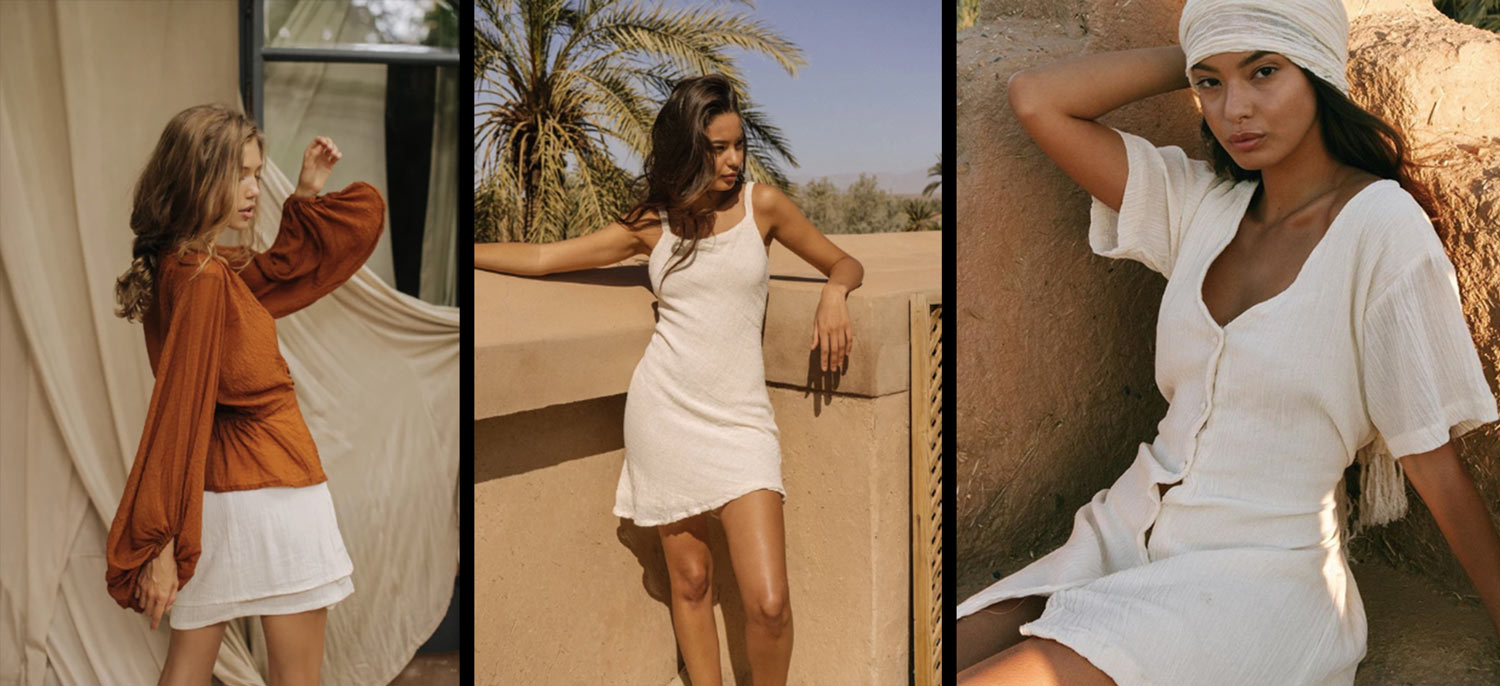June 9th, 2021
Constantly hitting the headlines, especially with the devastating Amazon, Australian and California wildfires in 2020, and with Sir David Attenborough announcing that “The moment of crisis has come” in efforts to tackle climate change, we all know now more than ever that we need to be trying to do more to help society and the environment.
We’ve reached a time where the need for ‘sustainable lifestyles’ has become imperative. Yes, as consumers we can say no to plastic straws, remember our bag for life and drink out of a chilly bottle, which are all great and important changes, but the accountability shouldn’t just fall upon the consumer. What accountability are brands taking? What brands are truly making a difference and ingraining it into their company so it’s not just a one-off campaign or gimmick?
Savannah Morrow The Label
With the fashion industry being the second most polluting industry behind coal mines and still synonymous with supporting slave labour, there is a major need for change and one brand that is leading the way on this is Californian based, Savannah Morrow The Label.
It is their mission to create one of the most beautiful and conscious fashion brands in the world. Why? Because, they see all that this earth provides for us, its people, and sadly they see the negative impacts the fashion industry leaves on this planet every day.

“I see both an urgent need and opportunity to bring change to the fashion industry. Therefore shying away is not an option, it is both an obligation and opportunity to equip myself with values, ideas, knowledge, and audacity to step out of the “current fashion system”. Because I believe that creating a beautiful sustainable fashion brand that is honest to our customers and respectful to our employees and our planet is most important.” – Savannah Morrow
From the very beginning, they haven’t just provided recyclable and plastic-free packaging, they are proud to say that they have always been on the path to sustainability.
From an eco friendly production house that respects its employees and pays above average wages, to using wild organic cotton that has been grown with no GMOS, fertilisers, pesticides or insecticides, as well as only naturally dyeing their fabrics, they are dedicated to maintaining sustainability despite the challenges this brings. They are constantly searching for new innovative ways throughout their whole supply chain to ensure the brand stays on the eco-friendly path and grows into one of the most beautiful and conscious fashion brands in the world.

Vitamin A
It’s estimated that by 2050, there will be a greater volume of plastic than fish in the ocean, with 1.4 billion tons of waste entering our seas every year, this is a statistic that Californian based swimwear brand, Vitamin A is only too aware of.
They believe that in today’s world, style and sustainability must go hand-in-hand, which is why they have put eco-consciousness at the heart of everything they do, from fabric innovation and manufacturing to packaging and partnerships. They aim not only to reduce their impact but also use their voice to raise awareness and generate change.

As well as making more than 95% of their products locally in California, only ever partnering with fair trade artisan groups, and using recycled packaging; one of Vitamin A’s biggest breakthroughs is its use of recycled and organic textiles. The founder, Amahlia Stevens, spent three years developing EcoLux™, the first premium swim fabric made from recycled nylon fibers, a breakthrough moment in sustainable swimwear, which has now become industry standard.
Now, each and every one of their fabrics is certified to meet the global Oeko-Tex standard for safe textiles, with one of them even being made from plant-based raw material sourced from the castor bean.

House of Sunny
With vintage-inspired colour palettes and prints, and with the likes of Kendall Jenner and Bella Hadid spotted in the clothing, House of Sunny proves that sustainability is most certainly in style.
Based in East London, the independent womenswear brand prides itself on producing small, sustainable runs of collections. It’s estimated that three out of five fast fashion items end up in a landfill, a figure that ‘slow’ fashion brand, House of Sunny does not want to be a part of. Producing just two collections a year, the brand uses a pre-order system to ensure every item is directly made to order and there are no wasted products, proudly acting out and against fast fashion.

How the product is made matters, with fewer collections this gives the dedicated team more time to thoroughly research to ensure they source sustainable fabrics and manufacturing methods. They only work with partners and suppliers who share their same vision of sustainability, accountability and transparency.
As well as using slower and less impactful methods of transportation, using garment bags that are plastic free and 100% biodegradable and compostable, and recycling and donating any textile scraps, House of Sunny ultimately wants its customers to buy less and wear what they have more.
Each product is carefully crafted so it can be worn everyday, with some items designed with multi-function and multi-wear abilities. Examples include detachable sleeves and faux fur cuffs and collars, so each piece can easily transition from one season to another, elevating the wardrobe with pieces that are designed to last and can be worn time and time again.

However, brands like these where sustainability is at the heart, are in the minority and are not the mainstream yet, although there are a lot of big brands that are making small differences. Although they have come under scrutiny in the past, H&M have a ‘Conscious’ collection, Weekday have produced a range of clothes that have been manufactured from 100% recycled materials and Mango have declared their commitment towards eco-friendly fashion through its Take Action programme, with a goal for 50% of the cotton used in its collections to be sourced sustainably by 2022; just to name a few.
These are all incredibly important stepping stones towards a sustainable future. However, whilst it is important for brands to take a stance on social issues, it’s vital that it’s not done as a one off and gimmick, as this could be faced with a lot of criticism. One example of this was how in 2020, a lot of brands came under criticism for how they reacted to the Australian bushfires, specifically fashion brands. Although it is incredible that brands donated profit and percentages of their takings, with many people blaming global warming and the damage we’re doing to the environment as the issue, it’s deemed hypocritical for fashion brands to donate when they themselves are a constant pollutant to the environment with the way they produce and manufacture their garments.

Brands need to instead look at the small changes that they can make and maintain to work towards a more sustainable future, focusing on what they believe in. This is something that will only become more integral to the brand in order to deliver to the consumer what they want. This is evidenced with how in 2020, nearly half of fast fashion retailers saw a decrease in sales that year and Lyst saw a 37% increase in searches for sustainability-related keywords, with the average monthly searches increasing from 27,000 in 2019 to over 32,000 in 2020.
66% of consumers are willing to spend more on a product if it comes from a sustainable brand and this figure rises to 73% for millennials, so it’s no wonder that the ethical fashion industry’s worth is expected to triple in less than a decade. With consumers wanting the companies they buy from to practice business sustainably and ethically, it’s time for brands to begin making changes, however small at first, in order to continue appealing to their audience, gain new customers and attract their future consumer.
Now is the time for brands to change and the time to change the prospects of the planet that we live on. We as consumers, as well as brands, all need to make a conscious effort to make a difference and then together we can leave a lighter footprint on the planet.
Written by Daisy Rogers, Head of Copy and Content, Hatched.
DISCLAIMER: We endeavour to always credit the correct original source of every image, however if you think a credit may be incorrect, please contact us at rb@hatchedlondon.com.




